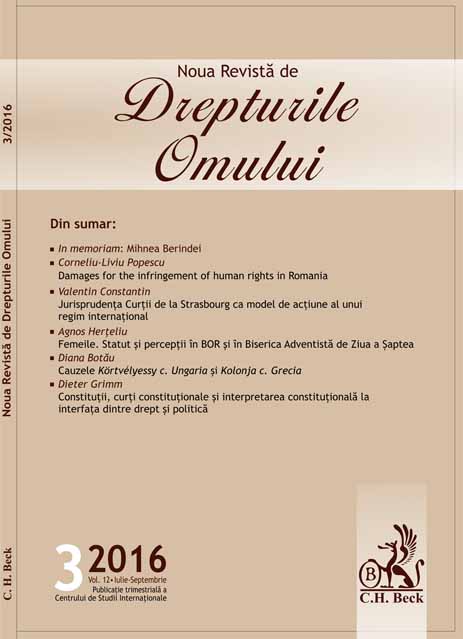Jurisprudenţa Curţii Europene a Drepturilor Omului – iulie-septembrie 2016
The Jurisprudence of the European Court of Human Rights – July-September 2016
Author(s): Dragoş Nicolae CostescuSubject(s): Politics / Political Sciences, Social Sciences, Law, Constitution, Jurisprudence
Published by: Centrul de Studii Internationale
Keywords: Private Life and Family; assisted human reproduction; gestation for another; Prohibition of torture; inhuman; right to liberty and security; European Convention on Human Rights
Summary/Abstract: 1. Private Life and Family; Art. 8 of the European Convention on Human Rights; Foulon and Bouvet v. France. The Court found that there was no violation of the right to respect for family life of the applicants major (parents with children), but that there was a violation of the right to privacy of children involved, conceived through gestation for another. Basically, the judgment in Bouvet Court ignores the role of motherhood and "mother" in family relationships. This creates the premise of eliminating discrimination in the matter of assisted human reproduction, in all modes, including pregnancy for another, and adoptions between same-sex couples on grounds of sex couple, focusing on the overriding interest of the child. 2. The right to liberty and security; Art. 5 of the European Convention on Human Rights; Buzadji v. Moldova. The Court considered that the reasons given for the arrangement and extension of the applicant's detention were neither sufficient nor relevant and thus violated art. 5 para. 3 of the European Convention on Human Rights. 3. Prohibition of torture, inhuman and degrading behavior; Art. 3 of the European Convention on Human Rights; J.K. and Others v. Sweden. Personal circumstances of the applicants and the diminished capacity of the Iraqi authorities to protect them should have been considered when evaluated their real risk of mistreatment if their return to Iraq, expulsion from Sweden. The Court found that there are substantial grounds for believing that the applicants would face a real risk of treatment contrary to Art. 3 Where would return to Iraq. Therefore, the Court considered that the implementation of the deportation order would entail a violation of art. 3.
Journal: Noua Revistă de Drepturile Omului
- Issue Year: 12/2016
- Issue No: 3
- Page Range: 111-115
- Page Count: 5
- Language: Romanian

